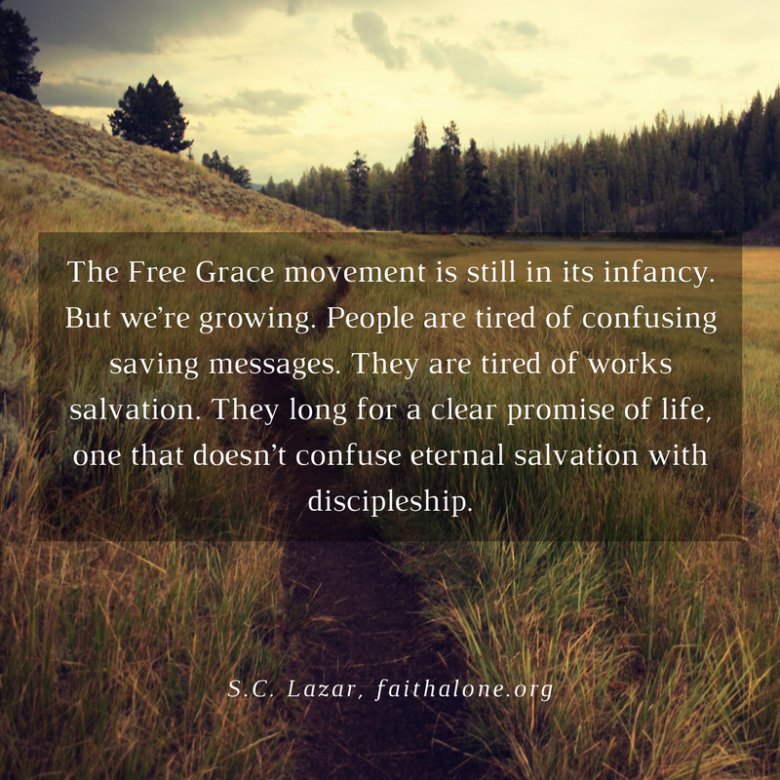I was recently sent this article, “Easy Like Friday Afternoon: A Manifesto on Hard-Believism” by Jared C. Wilson. He rejects “easy believism” for “hard believism.”
What self-professing “easy-believists” think is that they are upholding the free gift of grace by insisting one can believe without actually changing, that one can have the benefits of Christ’s salvation without actually worshiping him as Lord, and some will charge the “hard-believists” with being scandalized by grace.
I am a self-professed easy-believist (although I prefer the term Free Grace), so let me offer some responses to the claims he makes in the article.
What Happens at the Moment of Faith
Wilson says that we believe that “one can believe without actually changing.” That’s false. We believe that the moment someone believes in Jesus for eternal life a profound change occurs, i.e., you become born-again and receive everlasting life that cannot be lost! That, of course, is a profound change with eternal significance. Moreover, Lewis Sperry Chafer and R. B. Thieme list at least 40 things that change the moment you believe in Jesus (see here). At the moment of faith, many changes happen.
The Difference Between Salvation and Discipleship
However, I think Wilson means easy-believists think you can be born-again without changing your behavior afterwards. And that is true. We are not theological determinists. We do not believe that sanctification is unconditional. Rather, we think it is conditional. It is entirely possible for someone to hear the saving message, believe it, become born again, and then never progress to spiritual maturity.
The larger issue here is the nature of grace. We do not understand “grace” in a mechanistic/causal way where God unconditionally causes salvation to happen apart from free human response. Rather we take “grace” as God’s mental attitude of favor towards us, especially in offering us eternal life by faith in His Son, apart from works.
Naturally, this impacts our view of sanctification. Whereas Wilson seems to hold a deterministic view of sanctification, we believe that becoming a mature disciple is contingent, not guaranteed, and is achieved by a faith that works, and not by faith alone. Personally, I do not understand how anyone can hold the view that sanctification is unconditionally caused by God. The Bible clearly shows that growing and maturing in your faith is conditional, and not guaranteed. How else can you explain Adam’s fall, Cain’s murder, Saul’s jealousy, David’s adultery, Solomon’s idolatry, Peter’s denials, or the Corinthians’ carnality, to name just a few examples? I cannot read the parable of the Four Soils or the Parable of the Ten Minas and come away with the idea that God causes every believer to become spiritual mature.
In other words, Free Grace Theology draws a sharp distinction between eternal salvation and discipleship. If you’re not clear on the difference, I recommend Charles Bing’s recent book, Grace, Salvation, and Discipleship: How to Understand Some Difficult Bible Passages. Or you can reference this handy chart outlining the difference, available here.
Judging from the proof-texts Wilson uses to justify “hard believism” for salvation (e.g., Matthew 7:13-14; 19:25-26; James 2:17) I don’t think he understands that eternal salvation and discipleship have very difference conditions. I would encourage him to go to faithalone.org, or the Free Grace Discussion Group, look up the relevant passages, and consider alternative interpretations.
What Is Belief?
I strongly take issue with what Wilson says here, about our alleged confusion on the nature of faith:
[E]asy-believists are doctrinally dense and categorically confused. They say all one needs to be justified is belief—which is true—but they are hard pressed to define what belief is. They cannot explain how one can trust without, you know, actually trusting (emphasis his).
On the contrary, I don’t think we’re hard pressed to define belief at all. It’s actually very simple (although I’ve noticed that hard-believists make it very hard, see here).
To have faith is to be persuaded that a proposition is true, and to have saving faith is to be persuaded that the saving proposition is true (e.g, the promise of eternal life).
For example, Jesus promised:
“Truly, truly, I say to you, he who believes has eternal life” (John 6:47).
If you believe that promise is true, then what, according to Jesus, do you have?
Would Wilson add a condition other than faith to Jesus’ promise? Or, as is most likely, would he redefine faith to include works?
Wilson says that we “cannot explain how one can trust without, you know, actually trusting.”
I think we can explain it very simply.
If I trust someone, that means I think they habitually tell me the truth. Likewise, to trust Jesus is to be persuaded that what He teaches and promises is true.
Using trust as a synonym for faith, however, can lead to confusion. Wilson is a case in point. He seems to think that trust involves more than just belief. Bob and I discuss the nature of “trust” here and here.
Conclusion
The Free Grace movement is still in its infancy. But we’re growing. People are tired of confusing saving messages. They are tired of works salvation. They long for a clear promise of life, one that doesn’t confuse eternal salvation with discipleship. Maybe Wilson longs for that too.


